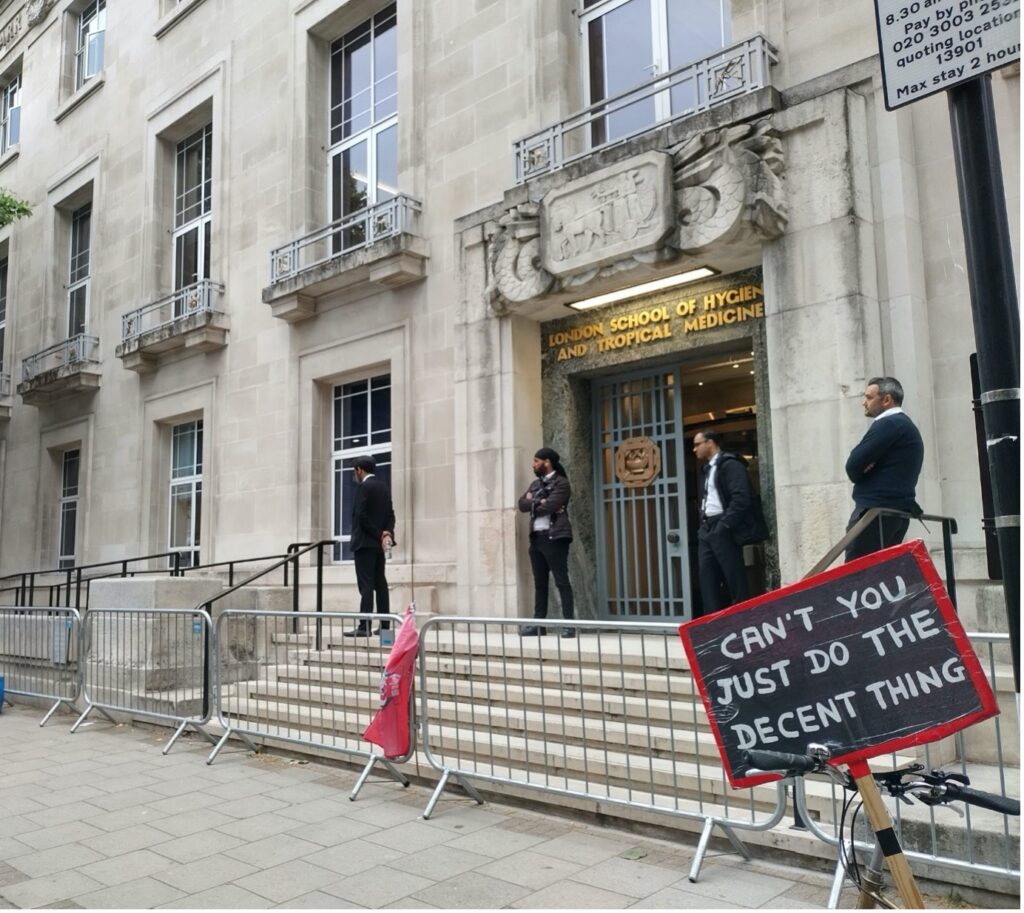Essential workers at the London School of Hygiene & Tropical Medicine (LSHTM) won a brave campaign to be insourced, after keeping the School safe throughout the pandemic. It will be effective on 01 August 2022. Since the insourcing announcement was made, LSHTM has been reticent to negotiate their salary with the workers and to recognise the grassroots union that they chose to represent them and lead the campaign, the IWGB. Subsequently, they started a public campaign to call the School to negotiate with them, which led to some workers who have engaged in union-related activities to be formally disciplined.
In an Open letter published on the 11th of July 2022, over 100 academics, researchers and students from the LSHTM, public health, and wider academic community have called the LSHTM’s Senior Management to meet essential workers’ demands of fair treatment and pay, and to ask for the immediate annulation of disciplinary sanctions faced by some of the workers engaged in union activities and campaigns. Since publication, i.e. three days later at the time of writing, the letter has been read more than 700 times and 50 more members of the academic community joined their voices to support the workers, making a total of 177 signatories.
As members of the public health and academic communities, we teach, conduct research and impact activities worldwide advocating for community empowerment and action on social determinants of health. Income, employment and working conditions are some of the most important social determinants of health. The situation at LSHTM is unacceptable per se, especially the use of disciplinary measures against the lowest paid workers from BAME and migrant communities.
These are practices that I have heard about very much in my research on labour exploitation. I started researching this topic during my PhD… at LSHTM. Since 2014, I have attended public events, union and migrant associations meetings, and interviewed migrant workers in low-paid jobs in London and some organisations supporting them. In far too many workplaces, including universities, workers are exposed to various forms of abuse and feel they are “not treated as human beings” (as many workers mentioned). Often, the abuse is structural, notably via the use of disproportionate sanctions and threats of dismissal for workers complaining about their unfair conditions.
The disproportionate use of sanctions, but also calling the police on a peaceful protest with mainly racialised people chanting and dancing as I witnessed it on the Thursday 21st April 2022, are perceived as threats by workers. Low-paid, precarious and migrant workers are not unfamiliar with institutions’ refusal to recognise the union that they chose. All these barriers may result in preventing workers’ ability to feel empowered and act on their own labour conditions and prospects for a better life and wellbeing. This is particularly worrisome in the current cost-of-living crisis and threats on the right to protest in the UK.
Beyond that, such situation opens a wider debate for our community: Do renowned institutions like LSHTM – which advises the government and other organisations on pandemic response and addressing social determinants of health – have a duty to apply the principles they preach in their own premises? I am a true believer that universities should be places of good practice and role models, applying the values that we preach. And I know I am not the only one, as illustrated by the open letter. What is at stake at LSHTM, in fact, seriously threatens the reputation of and public trust in our public health and academic community.
Our Open Letter is a powerful statement that Academics are not in an Ivory Tower and care very much about what happens in our own institutions and society. We want the values we teach and research to be applied in our institutions. We call the London School of Hygiene & Tropical Medicine to annul the disproportionate actions faced by union members and negotiate with our colleagues, their essential workers. Further, we call places of power that generate knowledge and recommendations for improving health, wellbeing and societies to be role models so that we can keep (or maybe repair) the public trust in our work.


About the author: Dr Sabah Boufkhed is an interdisciplinary global health researcher committed to social justice. She is a Lecturer in Global Health at The University of Manchester’s Humanitarian and Conflict Response Institute where she teaches in global health programmes, including Health systems and Community approaches to health. Her research topics include labour exploitation and migrant workers’ health, and preparedness and response to public health emergencies. She co-founded organisations aiming at empowering and supporting women and ‘minorities’ in science and academia.
Competing interests: I have read and understood the BMJ Group policy on declaration of interests and declare the following interests: I am an LSHTM alumni and a member of the Academic and Global Health community.
Handling Editor: Seye Abimbola and Neha Faruqui
Note: The London School of Hygiene and Tropical Medicine (LSHTM) has responded to the content of this post. Please see LSHTM’s published response here.